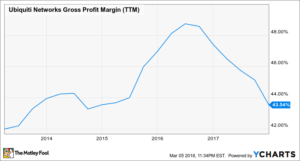
Ubiquiti Networks (NASDAQ: UBNT) hit an all-time high of $82 in late January, plunged to $55 in February, then rebounded to the high $60s. That big drop was caused by a mixed second-quarter report and the disclosure of an SEC probe last month.
Ubiquiti mainly sells long-distance wireless data communication products for service providers and enterprise customers. It recently entered the consumer market with its AmpliFi wireless system, which brings enterprise-class WiFi performance to home users.
Investors might be wondering if Ubiquiti’s recent rebound indicates that it’s safe to buy this stock. Let’s dig deeper into the bull and bear cases to find out.
What the bulls think
Last year, Ubiquiti’s revenue rose 30%, its net income improved 21%, and its diluted earnings per share grew 24%. That growth was attributed to robust sales of its UniFi access points, switches, gateways, and IP cameras to enterprise customers, and strong sales of its airMAX and EdgeMAX products to service providers.
Its AmpliFi products got off to a rough start last year, but sales have been improving. During last quarter’s conference call, founder and CEO Robert Pera declared that AmpliFi has “done extremely well and is a profitable business.”
Ubiquiti uses a low-overhead model to produce networking products that are generally cheaper than competing solutions. Its niche products are also well insulated from the saturation of the traditional networking equipment market, which is dominated by bigger companies like Cisco (NASDAQ: CSCO) and Huawei.
Pera also noted that the company’s LTU (long-term Ubiquiti) project will eventually replace high-end base station equipment — which often costs “tens of thousands” of dollars — with “jaw-dropping” lower prices over the next five or six years. Those new products could threaten traditional base station suppliers like Cisco and Nokia.
For the current year, analysts expect Ubiquiti’s revenue and earnings per share to rise 16% and 19%, respectively. Ubiquiti trades at 19 times forward earnings, which is a reasonable multiple for a company with double-digit earnings growth.
What the bears think
Ubiquiti’s core strength is its ability to produce cheaper products while maintaining high margins and double-digit earnings growth. Unfortunately, Ubiquiti’s gross margins have been contracting over the past year.

The second quarter of 2018 was particularly ugly for Ubiquiti, as its non-GAAP net income dipped 1% to $59.6 million and it posted a GAAP loss on tax expenses. Ubiquiti attributed that abrupt bottom line decline to provisions from obsolete inventories, vendor deposits, and losses related to weak sales of its FrontRow wearable cameras.
Meanwhile, if Cisco, Nokia, and other network equipment vendors start recognizing Ubiquiti’s disruptive potential, they could develop similar long-distance WiFi products, bundle them with other products, and undercut Ubiquiti to grow their market shares.
A few months ago, short seller Citron Research claimed that Ubiquiti ran a fraudulent business model, questioning the integrity of its distributors, its corporate culture, and its unrealistically high margins and cash balances. At the time, Pera dismissed Citron’s claims, tweeting that he would “let the products and numbers speak for themselves.”
However, the SEC launched a probe into Ubiquiti in mid-February, and subpoenaed documents and information related to its accounting practices, auditors, international trade practices, and relationships with distributors and other companies. Unless this probe is resolved, Ubiquiti could remain a popular target for short sellers, with nearly 30% of its shares being shorted as of Feb. 27.
The verdict: Avoid Ubiquiti Networks
Last December, I claimed that it was time to “get greedy” with Ubiquiti’s stock. However, Ubiquiti’s declining margins, its second-quarter earnings miss, and the SEC probe forced me to dial back my bullishness. I’m not bearish on Ubiquiti yet, but I’d avoid the stock until all the smoke clears.


